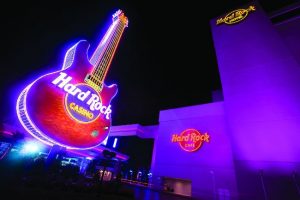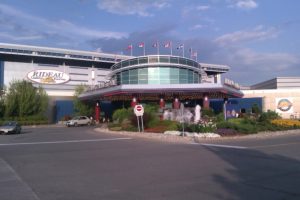 Last month, Ontario Lottery Corp. (OLG) selected Hard Rock International as the winning bidder to assume control over Rideau Carleton Raceway. The company inked a 20-year long deal with OLG, under which the two companies are to jointly invest $320 million in expanding and modernizing Rideau Carleton Raceway and Hard Rock is acquire 51% of the Rideau Carleton Raceway. Hard Rock was allowed to install up to 21 gaming tables and to increase the number of slot machines up to 1,250. This week it emerged on the surface that Hard Rock is seeking to expand the number of allowed gaming tables to 35 by skirting council approval.
Last month, Ontario Lottery Corp. (OLG) selected Hard Rock International as the winning bidder to assume control over Rideau Carleton Raceway. The company inked a 20-year long deal with OLG, under which the two companies are to jointly invest $320 million in expanding and modernizing Rideau Carleton Raceway and Hard Rock is acquire 51% of the Rideau Carleton Raceway. Hard Rock was allowed to install up to 21 gaming tables and to increase the number of slot machines up to 1,250. This week it emerged on the surface that Hard Rock is seeking to expand the number of allowed gaming tables to 35 by skirting council approval.
In 2013 the city council announced that it is to approve casino expansion providing that it is built at the racetrack and the number of table games is capped to a maximum of 21. In mid-May this year, casino operator Hard Rock International officially announced that it is set to bet on the Canadian gambling market. The company entered a bidding war for the Rideau Carleton Raceway in Canada’s capital city Ottawa. The company planned to make the most of the Canadian gambling market and deploy its full potential, which remained hidden behind the worn-out gambling venues.
After winning the coveted Rideau Carleton Raceway, the company signed a contract with OLG for the day-to-day operations of the raceway. Under the deal, the casino operator is to take over Rideau Carleton Raceway. The multi-million expansion project was announced to be a joint venture between the two companies, which agreed to invest $320 million in total.
Hard Rock Tries to Circumvent Ontario’s Laws
 But the things took an unexpected turn. It was revealed that Hard Rock is trying to circumvent the land use laws and quietly receive an approval for the installation of 35 gambling tables instead 21, as it promised at first. According to reliable sources, the new owners of Rideau Carleton Raceway asked the city’s committee of adjustment to approve 67% increase in the number of allowed gambling tables. The city’s committee of adjustment is allowed to take decisions that are not a subject to public scrutiny. In that sense, Hard Rock is viewed as seeking for subversive means to achieve its goal.
But the things took an unexpected turn. It was revealed that Hard Rock is trying to circumvent the land use laws and quietly receive an approval for the installation of 35 gambling tables instead 21, as it promised at first. According to reliable sources, the new owners of Rideau Carleton Raceway asked the city’s committee of adjustment to approve 67% increase in the number of allowed gambling tables. The city’s committee of adjustment is allowed to take decisions that are not a subject to public scrutiny. In that sense, Hard Rock is viewed as seeking for subversive means to achieve its goal.
The news came out of the blue to city councilors, who expressed their reluctance to approve Hard Rock’s request. OLG, known to be responsible for the province’s gambling industry, also gave thumbs down to the additional gaming tables. In an e-mail, the agency stated that Hard Rock is obliged to present a detailed model of the project to OLG. The agency added that prior to the installation of the gambling tables, Hard Rock should receive a green light from Ontario’s authorities. On 15th November, the operator’s request is to be put on the table and the committee of adjustment and the public will be allowed also to participate. The committee is allowed to refuse to hear the case under certain circumstances related to the nature of the request.



















